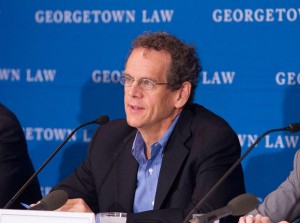
WASHINGTON — The American Civil Liberties Union (ACLU) announced today that its new national legal director, David Cole, will testify at Sen. Jeff Sessions’ confirmation hearing for attorney general Jan. 11.
The ACLU is nonpartisan, and as a matter of longstanding policy does not support or oppose nominees for federal office. As a result, the ACLU rarely testifies in confirmation hearings. However, the organization is taking the extraordinary step of testifying in this hearing because Sen. Sessions’ record raises significant, serious questions about his hostility to civil rights and civil liberties. The ACLU believes he must satisfactorily answer questions on these issues before a confirmation vote proceeds.
Sessions has been in this seat before, when he was tapped by President Ronald Reagan for a federal judgeship in 1986. Things did not go well.
Witnesses accused Sessions, then the U.S. attorney for the southern district of Alabama, of repeatedly making racially insensitive and racist remarks. Thomas Figures — a former assistant U.S. attorney in Mobile, Alabama, who worked for Sessions — told the Senate Judiciary Committee that his former boss said he thought the Ku Klux Klan was okay until he learned members smoked pot. Sessions said the comment wasn’t serious. Figures, an African-American man, also alleged that Sessions called him “boy” and told him “to be careful what you say to white folks.” Sessions denied this, too.
But Figures wasn’t alone. Visiting Mobile, Alabama, from Washington, D.C., a Justice Department lawyer heard Sessions call the ACLU “un-American” and “communist-inspired.” He also heard Sessions opine that ACLU and the NAACP “did more harm than good when they were trying to force civil rights down the throats of people who were trying to put problems behind them.” Sessions said he didn’t recall saying that but admitted he could be “loose with my tongue” at the office. Not surprisingly, a civil rights coalition of over 160 groups and members of the Alabama Legislature separately opposed the Sessions’ nomination and asked the Senate Judiciary Committee to vote no on the young attorney from Hybart, Alabama. In a bipartisan vote, committee members refused to confirm Sessions, making him just the second judicial nominee in 49 years to be denied confirmation by the Senate Judiciary Committee at that time.











